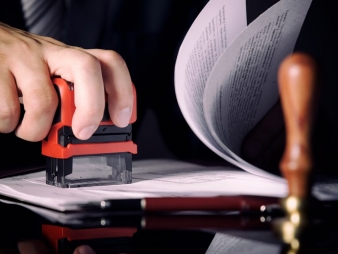Tired of having to track down a notary public in order to have your signature on a deed or mortgage properly acknowledged? Ohio’s Notary Public Modernization Act (Senate Bill 263), which was signed into law on December 19, 2018, may make this process easier for you.
Online Notarization
Effective September 20, 2019, a properly registered and trained notary is authorized to perform notarizations online in Ohio.
How will this work?
The notary and the signer will connect through a live video and audio feed on their respective computers, iPhones or other electronic devices. The notary will verify the identity of the signer by having the signer present government issued identification and by confirming the signer’s identity through a “credential analysis.” Then the notary will acknowledge the signer’s signature on the subject document and will add his or her electronic signature and seal to the document. The notary must maintain a recording of the process as well as an electronic journal in which the notary records in chronological order detailed information regarding all online notarizations. The notary performing this service must be physically in the state of Ohio at the time the online notarization takes place.
A “credential analysis” is a process by which a third person will confirm the validity of the identification presented by the signer. The Ohio Secretary of State is required to adopt standards describing how a credential analysis may take place.
In order to be authorized by the Ohio Secretary of State to provide online notary services, the notary public must be an Ohio resident, pay a fee, complete special training, and take a test. The authorization will last for five years (this applies to both attorneys and non-attorneys).
The Ohio Secretary of State is required to establish the standards for online notarization including video and audio conferencing standards, online notarial certificates, the required educational course, and other rules applicable to online notarization. As of the publishing of this article, the Secretary’s standards and rules have not been published.
Electronic Notarization
Senate Bill 263 also authorizes any notary public to notarize an electronic document signed with an electronic signature in the notary’s physical presence.
Documents which are notarized either through use of an online notarization or through electronic notarization are to be considered original documents by the county auditor, engineer, and recorder.
Other provisions of note in Senate Bill 263 include an increase in the registration fees for notaries; a requirement that all existing notaries complete a criminal background check prior to renewing their commission; and that all new notaries complete a criminal background check, educational classes, and pass a test. Attorneys are exempt from the requirement of completing a background check and taking a test.


